CARDIOLOGY PROCEDURES
It is mandatory to present your medical prescription to be able to carry out the tests.
If you are a pregnant woman or if you suspect that you may be so, or if you are breast-feeding,
please notify it to our health staff before performing any test.
All nuclear medicine tests involve the administration of a radiopharmaceutical
with a very low dose of radioactivity, which is eliminated in the following hours through the urinary or digestive routes.
The access of companions to the center is allowed in the case of children and patients who require special attention.
The rest of the patients can come accompanied but, as a health precaution during the pandemic and depending on
the capacity of the waiting room and the criteria of our staff, it is possible that
the companion cannot wait inside the center.
CARDIOLOGY PROCEDURES
It is mandatory to present your medical prescription to be able to carry out the tests.
If you are a pregnant woman or if you suspect that you may be so, or if you are breast-feeding,
please notify it to our health staff before performing any test.
All nuclear medicine tests involve the administration of a radiopharmaceutical
with a very low dose of radioactivity, which is eliminated in the following hours through the urinary or digestive routes.
The access of companions to the center is allowed in the case of children and patients who require special attention.
The rest of the patients can come accompanied but, as a health precaution during the pandemic and depending on
the capacity of the waiting room and the criteria of our staff, it is possible that
the companion cannot wait inside the center.
abc
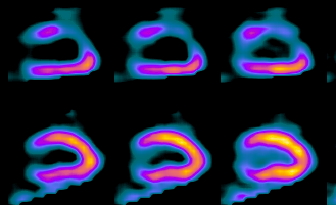
Stress/rest baseline and pharmacological stimulated miocardic perfusion SPECT
DESCRIPTION: The stress/rest myocardial perfusion SPECT is the gold standard for evaluating minimally aggressive coronary disease.
PREPARATION: A 3-4 hour fasting is required. In the case of pharmacological stimulation with dipyridamole, it is essential to avoid the consumption of xanthines (caffeine, theophyllines: coffee, Coca Cola, tea) 24 hours before the test. Depending on the drug, the weight of the patient and the criteria of the nuclear medicine doctor, effort and rest detections can be made on the same day (short protocol) or on different days (long protocol).
INDICATIONS: It is indicated in:
- Diagnosis of coronary disease in cases with atypical symptoms, diabetes, female sex.
- Evaluation of myocardial viability.
- Evaluation of coronary heart disease, evolutionary control and response to treatment control.
DURATION OF PROCEDURE: 4 hours.
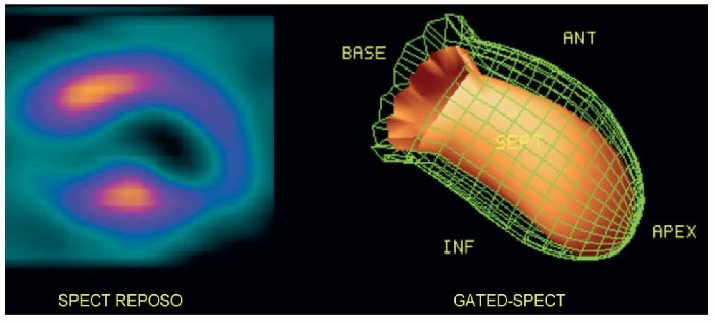
REST CARDIAC PERFUSION
TOMOSCINTIGRAPHY (SPET)
DESCRIPTION: Normofunctional study of myocardial perfusion in a baseline situation by means of the intravenous administration of a radiotracer marked with technetium or thallium to evaluate the alterations of myocardial perfusion at rest (extension of necrosis and myocardial viability).
PREPARATION: No previous preparation is required. It may be necessary to administer sublingual nitrates and to monitor blood pressure.
INDICATIONS: Evaluation of the extent of myocardial necrosis. Assessment of myocardial viability.
DURATION OF PROCEDURE: Administration-detection times depend on the radiotracer used (thallium: 3-4 and 24 hours, technetium compounds: 60 minutes).
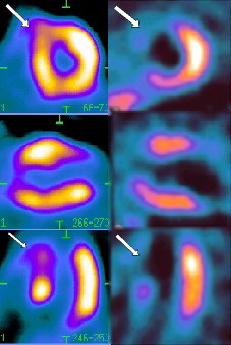
18F-FDG CARDIAC PET-CT
DESCRIPTION: Study of the metabolism of cardiac glucose, as part of myocardial perfusion studies.
PREPARATION: Six-hour fasting is required. The patient should not perform intense physical exercise 24 hours before the study. Insulin clamp or glucose oral overload is required.
INDICATIONS: Study of myocardial viability.
DURATION OF PROCEDURE: 2 hours.
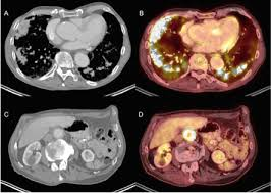
18F-FDG PET-CT FOR THE DETECTION OF INFLAMMATORY AND INFECTIOUS PROCESSES
IN CARDIOVASCULAR DEVICES
DESCRIPTION: Detection of areas with inflammatory or infectious phenomena.
PREPARATION: 6-hour fasting is required. A special diet is needed to inhibit the physiological uptake of FDG by the heart. Good hydration.
INDICATIONS: Suspected infection of intravascular devices, pacemakers and catheters.
DURATION OF PROCEDURE: 90 minutes.
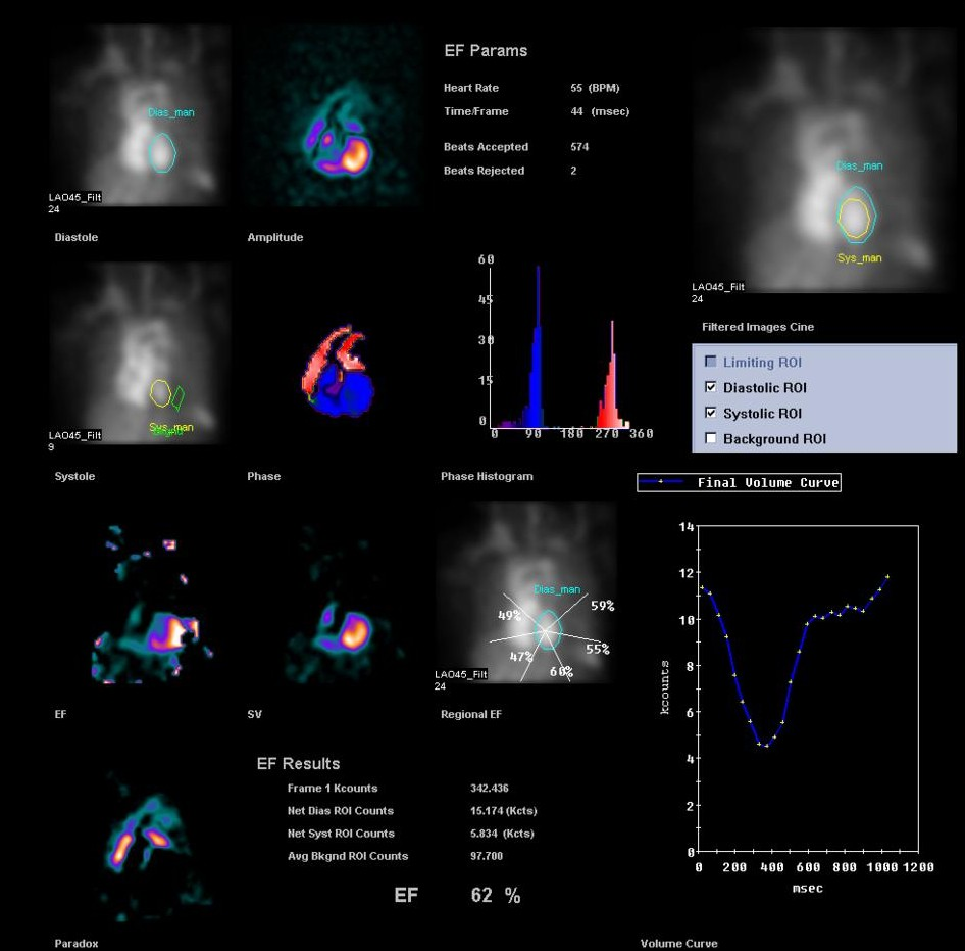
GATED/NON-GATED EQUILIBRIUM ISOTOPE VENTRICULOGRAPHY (STRESS/REST)
POST-PHARMACOLOGIC-INTERVENTION (DOBUTAMINE) EQUILIBRIUM ISOTOPIC VENTRICULOGRAPHY
DESCRIPTION: Evaluation of blood circulation through the heart and assessment of its pumping and contracting function after physical effort. The systolic and diastolic function of both cardiac ventricles is assessed, as well as their overall ejection fraction, the regional left ventricle ejection fraction, and the regional contractility. The procedure also allows for the calculation of ventricular volumes during the effort phase.
PREPARATION: A 4-hour minimum fasting is required.
INDICATIONS: Assessment of left ventricular ejection fraction behavior at rest and the subsequent response to a physical effort, mainly for the diagnosis of coronary artery disease of patients who have suffered a cardiac infarction and for the evolutionary control of patients with aortic insufficiency.
DURATION OF PROCEDURE: 90 minutes.
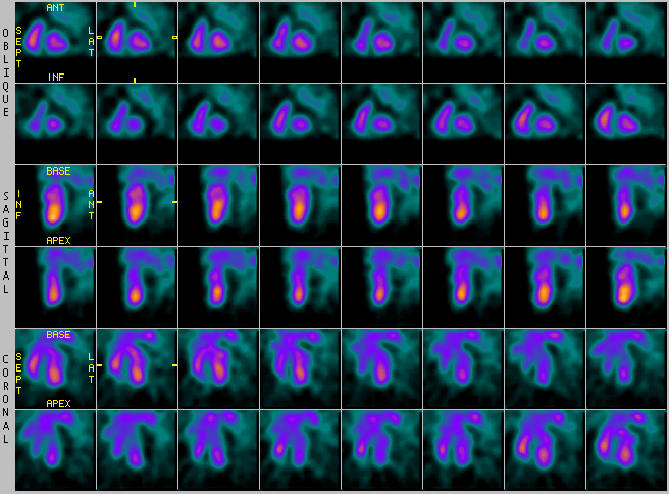
REST EQUILIBRIUM ISOTOPE VENTRICULOGRAPHY
GATED-SPET ISTOTOPE VENTRICULOGRAPHY
DESCRIPTION: Evaluation of blood circulation through the heart and assessment of its pumping and contracting function IN BASELINE SITUATION. The systolic and diastolic function of both cardiac ventricles is assessed, as well as their overall ejection fraction, the regional left ventricle ejection fraction, and the regional contractility. The procedure also allows for the calculation of ventricular volumes.
PREPARATION: No previous preparation is required.
INDICATIONS: Ischemic cardiophaty: Diagnosis: Evaluation of ejection fraction of left ventricle at rest and the existence of alterations of the regional contractility. Acute cardiac infarction: Stratification of patients according to their functional situation after necrosis by means of ejection fraction measurements, being this and VTS the parameters with the highest prognostic value after an infarct; evaluation of regional contractility (areas of hypokinesia, akinesia or dyskinesia, and detection of right ventricle infarction) and study of ventricular remodeling after necrosis. Valvulopathies: evolutionary control of the function and ventricular volumes. Conduction disorders: Evaluation of ventricular function and description of the myocardial contraction sequence: pacemaker situation, pre-excitation syndromes, ventricular tachycardia. Myocardiopathies: Evolution of the function in myocardial pathology of any etiology. Control of myocardial involvement by chemotherapies (adriamycin).
DURATION OF PROCEDURE: 1 hour.
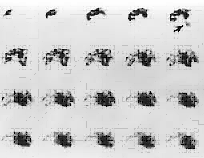
LEFT-RIGHT CARDIAC SHORT CIRCUIT SCINTIGRAPHY
SHUNTS QUANTIFICATION
FIRST-PASS ISOTOPE VENTRICULOGRAPHY
DESCRIPTION: Study of the arrival of a radioactive tracer to the heart and lungs through central circulation.
PREPARATION: No preparation is required.
INDICATIONS: Evaluation of left-right shunts. Diagnosis, quantification and monitoring of heart short circuits. Evaluation of left and right ventricular function.
DURATION OF PROCEDURE: 15 minutes.
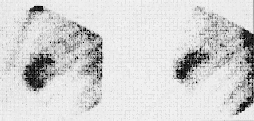
PYROPHOSPHATE CARDIAC
TOMOSCINTIGRAPHY (SPET)
PYROPHOSPHATE CARDIAC
SCINTIGRAPHY
DESCRIPTION: Assessment of acute myocardial damage.
PREPARATION: Sufficient hydration, from the moment of administration of the dose until detection (2-3 hours). No fasting required. The maximum sensitivity interval is between the second and fifth days after the acute episode in the case of heart infarction.
INDICATIONS: Diagnosis of cardiac infarction in situations where the usual procedures have limited efficacy (infarction without Q wave, preoperative, driving disorders). Predictive cardiac infarction information (right-ventricle affectation, location, size). Diagnosis of infectious myocardiopathies: amyloidosis and scleroderma.
DURATION OF PROCEDURE: About 3 hours.

123I-MIBG CARDIAC INNERVATION SCINTIGRAPHY
CARDIAC INNERVATION TOMOSCINTIGRAPHY (SPET/SPET-CT)
DESCRIPTION: Study of sympathetic adrenergic activity.
PREPARATION: Blocking of the thyroid gland with 20 drops of potassium iodine, 45-60 minutes before tracer injection.
INDICATIONS: Study of sympathetic adrenergic activity in patients with ventricular arrhythmias, Parkinson’s disease, dementia with Lewy bodies, diabetes, ischemic heart disease, heart transplants.
DURATION OF PROCEDURE: From 5 to 6 hours.
Stress/rest baseline and
pharmacological stimulated)
miocardic perfusion SPECT
DESCRIPTION
The stress/rest myocardial perfusion SPECT is the gold standard for evaluating minimally aggressive coronary disease.
PREPARATION
- A 3-4 hour fasting is required.
- In the case of pharmacological stimulation with dipyridamole, it is essential to avoid the consumption of xanthines (caffeine, theophyllines: coffee, Coca Cola, tea) 24 hours before the test.
- Depending on the drug, the weight of the patient and the criteria of the nuclear medicine doctor, effort and rest detections can be made on the same day (short protocol) or on different days (long protocol).
INDICATIONS
- Diagnosis of coronary disease in cases with atypical symptoms, diabetes, female sex.
- Evaluation of myocardial viability.
- Evaluation of coronary heart disease, evolutionary control and response to treatment control.
DURATION OF PROCEDURE
4 hours.
REST CARDIAC PERFUSION
TOMOSCINTIGRAPHY (SPET)
DESCRIPTION
Normofunctional study of myocardial perfusion in a baseline situation by means of the intravenous administration of a radiotracer marked with technetium or thallium to evaluate the alterations of myocardial perfusion at rest (extension of necrosis and myocardial viability).
PREPARATION
-
No previous preparation is required.
-
It may be necessary to administer sublingual nitrates and to monitor blood pressure.
INDICATIONS
-
Evaluation of the extent of myocardial necrosis.
-
Assessment of myocardial viability.
DURATION OF PROCEDURE
Administration-detection times depend on the radiotracer used:
- Thallium: 3-4 and 24 hours
- Technetium compounds: 60 minutes).
18F-FDG CARDIAC PET-CT
DESCRIPTION
Study of the metabolism of cardiac glucose, as part of myocardial perfusion studies.
PREPARATION
-
Six-hour fasting is required.
-
The patient should not perform intense physical exercise 24 hours before the study.
-
Insulin clamp or glucose oral overload is required.
INDICATIONS
Study of myocardial viability.
DURATION OF PROCEDURE
2 hours.
18F-FDG PET-CT FOR THE DETECTION OF INFLAMMATORY AND INFECTIOUS PROCESSES IN CARDIOVASCULAR DEVICES
DESCRIPTION
Detection of areas with inflammatory or infectious phenomena.
PREPARATION
-
6-hour fasting is required.
-
A special diet is needed to inhibit the physiological uptake of FDG by the heart.
-
Good hydration.
INDICATIONS
Suspected infection of intravascular devices, pacemakers and catheters.
DURATION OF PROCEDURE
90 minutes.
GATED/NON-GATED EQUILIBRIUM ISOTOPE
VENTRICULOGRAPHY (STRESS/REST)
POST-PHARMACOLOGIC-INTERVENTION (DOBUTAMINE)
EQUILIBRIUM ISOTOPIC VENTRICULOGRAPHY
DESCRIPTION
Evaluation of blood circulation through the heart and assessment of its pumping and contracting function after physical effort. The systolic and diastolic function of both cardiac ventricles is assessed, as well as their overall ejection fraction, the regional left ventricle ejection fraction, and the regional contractility. The procedure also allows for the calculation of ventricular volumes during the effort phase.
PREPARATION
A 4-hour minimum fasting is required.
INDICATIONS
Assessment of left ventricular ejection fraction behavior at rest and the subsequent response to a physical effort, mainly for the diagnosis of coronary artery disease of patients who have suffered a cardiac infarction and for the evolutionary control of patients with aortic insufficiency.
DURATION OF PROCEDURE
90 minutes.
REST EQUILIBRIUM ISOTOPE VENTRICULOGRAPHY
GATED-SPET ISTOTOPE VENTRICULOGRAPHY
DESCRIPTION
Evaluation of blood circulation through the heart and assessment of its pumping and contracting function IN BASELINE SITUATION. The systolic and diastolic function of both cardiac ventricles is assessed, as well as their overall ejection fraction, the regional left ventricle ejection fraction, and the regional contractility. The procedure also allows for the calculation of ventricular volumes.
PREPARATION
No previous preparation is required.
INDICATIONS
- Ischemic cardiophaty:
- Diagnosis: Evaluation of ejection fraction of left ventricle at rest and the existence of alterations of the regional contractility.
- Acute cardiac infarction: Stratification of patients according to their functional situation after necrosis by means of ejection fraction measurements, being this and VTS the parameters with the highest prognostic value after an infarct:
- Evaluation of regional contractility (areas of hypokinesia, akinesia or dyskinesia, and detection of right ventricle infarction)
- Study of ventricular remodeling after necrosis.
- Valvulopathies: Evolutionary control of the function and ventricular volumes.
- Conduction disorders: Evaluation of ventricular function and description of the myocardial contraction sequence: pacemaker situation, pre-excitation syndromes, ventricular tachycardia.
- Myocardiopathies:
- Evolution of the function in myocardial pathology of any etiology.
- Control of myocardial involvement by chemotherapies (adriamycin).
DURATION OF PROCEDURE
1 hour.
LEFT-RIGHT CARDIAC SHORT CIRCUIT SCINTIGRAPHY
SHUNTS QUANTIFICATION
FIRST-PASS ISOTOPE VENTRICULOGRAPHY
DESCRIPTION
Study of the arrival of a radioactive tracer to the heart and lungs through central circulation.
PREPARATION
No previous preparation is required.
INDICATIONS
- Evaluation of left-right shunts.
- Diagnosis, quantification and monitoring of heart short circuits.
- Evaluation of left and right ventricular function.
DURATION OF PROCEDURE
15 minutes.
PYROPHOSPHATE CARDIAC
TOMOSCINTIGRAPHY (SPET)
PYROPHOSPHATE CARDIAC
SCINTIGRAPHY
DESCRIPTION
Assessment of acute myocardial damage.
PREPARATION
-
Sufficient hydration, from the moment of administration of the dose until detection (2-3 hours). No fasting required.
-
The maximum sensitivity interval is between the second and fifth days after the acute episode in the case of heart infarction.
INDICATIONS
-
Diagnosis of cardiac infarction in situations where the usual procedures have limited efficacy (infarction without Q wave, preoperative, driving disorders).
-
Predictive cardiac infarction information (right-ventricle affectation, location, size).
-
Diagnosis of infectious myocardiopathies: amyloidosis and scleroderma.
DURATION OF PROCEDURE
About 3 hours.
123I-MIBG CARDIAC INNERVATION SCINTIGRAPHY
CARDIAC INNERVATION TOMOSCINTIGRAPHY (SPET/SPET-CT)
DESCRIPTION
Study of sympathetic adrenergic activity.
PREPARATION
Blocking of the thyroid gland with 20 drops of potassium iodine, 45-60 minutes before tracer injection.
INDICATIONS
Study of sympathetic adrenergic activity in patients with:
- ventricular arrhythmias
- Parkinson’s disease
- Dementia with Lewy bodies
- Diabetes
- Ischemic heart disease
- Heart transplants
DURATION OF PROCEDURE
From 5 to 6 hours.

SIMM MOLECULAR, S.L.U. belongs to the ATRYS Group
ATRYS-SIMM IRLA Center
Josep Irla i Bosch Street, 5, Buildong 2
Barcelona 08034, Catalonia, SPAIN
Phone (+34) 93 204 6439
ATRYS-SIMM SJD Center
Santa Rosa Street, 39, Pediatric Cancer Center Barcelona
Esplugues de Llobregat 08950, Catalonia, SPAIN
Phone (+34) 93 254 0470
FAX: (+34) 93 204 9641 · EMAIL: info.simm@atryshealth.com
In ATRYS-SIMM your personal data is treated according to the principles and rights included in the Spanish laws GDPR 2016/679 of April 27th, 2016 and LOPDGDD 3/2018 of December 5th, 2018.
You can excercise your rights by contacting us by email to protecciondatos-sp@atryshealth.com.
SIMM MOLECULAR, S.L.U. belons to the ATRYS Group
ATRYS-SIMM IRLA
Josep Irla i Bosch Street, 5, Building 2
Barcelona 08034, Catalonia, SPAIN
Phone (+34) 93 204 6439
ATRYS-SIMM SJD
Santa Rosa Street, 39
Esplugues de Llobregat 08950, Catalonia, SPAIN
Phone (+34) 93 254 0470
FAX: (+34) 93 204 9641
E-MAIL: info.simm@atryshealth.com
At ATRYS-SIMM your personal data is treated in accordance with
the principles and rights contained in the GDPR law 2016/679 of
April 27, 2016 and in the LOPDGDD law 3/2018 of December 5, 2018.
You can exercise your rights by contacting us by
email to protecciondatos-sp@atryshealth.com.